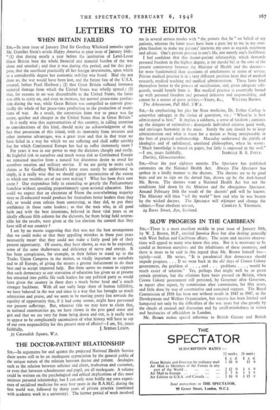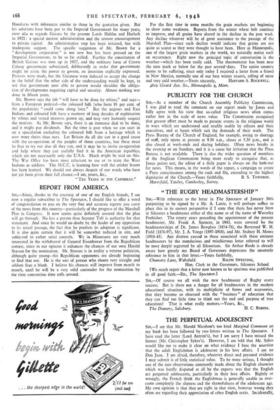SLOW PROGRESS IN THE CARIBBEAN Sut,—There is a most excellent
middle in your issue of January 30th, by W. J. Brown, M.P., entitled Jamaica Boss but also dealing generally with West Indian and Caribbean affairs. The acute and incisive observa- tions will appeal to many who know this area. But it is necessary to be candid as between ourselves and the inhabitants of these countries, and there is more to be said in this regard than Mr. Brown himself has- rightly—said. He writes, " It is paradoxical that democracy should impede progress. . . . If we were back in the old days of Crown Colony government, the problem of . . . , and . . . problems . . . , would be much easier of solution." Yes, perhaps that might well be so given certain premises, but the solutions have been pressed on Britain, when Crown Colony government still persisted, by Governor after Governor, in report after report, by commission after commission, for fifty years, and little done by way of constructive and sustained support. The Royal Commission of 1938 has been not without result in 1942 to 1947, in the Development and Welfare Organisation, but success has been limited and hampered not only by the difficulties of the war years but also greatly by the clouds of counsel and discussion and by small-mindedness in action and hesitancies of officialdom in London.
Mr. Brown makes special reference to British Guiana and British
Honduras with inferences similar to those in the quotation given. But his solutions have been put to the Imperial Government for many years, inter alia as regards Guiana by the present Lords Halifax and Harlech in 1921: a special interior administration and the utmost encouragement to private capital. An administrative step has been initiated, but with inadequate support. The specific suggestion of Mr. Brown for a " development corporation " is not new but has been pressed on the Imperial Government, to be so far stalled. Further the constitution of British Guiana was torn up in 1927, and the ordinary form of Crown Colony government substituted, deliberately in order that government might be given the power to govern, an intention explicitly expressed. Protests were made, but the Guianese were induced to accept the change in the belief that the other side of the understanding would be kept, to wit that government now able to govern would shoulder the obliga- tion of developments requiring capital and security. Almost nothing was done in fifteen years.
Mr. Brown says the job " will have to be done by whites," and says— from a European pedestal—the coloured folk (who form 95 per cent. of the population) " could come along later." But the negroes and East Indians and coloured folk have a memory of long decades of exploitation by whites and vested interests grown up, and may very humanly suspect the motives. As Mr. Brown says, there is an immense deal to be done, and it might pay dividends. But the time is past when we can start in on a speculation excluding the coloured folk from a heritage which is now more theirs than ours. Let Britain do all she can in a good cause with the co-operation of the peoples of those countries, but these must be free to try out also all they can, and it may be to invite co-operation and help where they can usefully find it in the American republics, which are not necessarily only the U.S.A. Much might be said on this. The War Office has been most reluctant to use or to train the West Indians as soldiers. The M.C.C. is learning how well the cricket lesson has been learned. We should not always despair of our wards who have not yet been given their full chance.—I am, yours, &c.,
" TEN YEARS IN THE CARIBBEAN."































 Previous page
Previous page